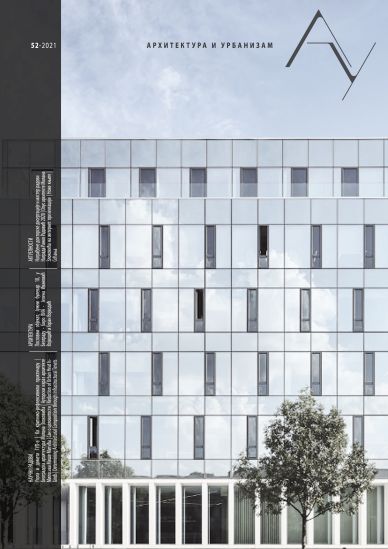THE DREAM OF WHOLENESS: THE POETICS OF THE UNPREDICTABLE
Abstract
By redefining the notion of fragmentarity and existing theoretical conceptions, from romantic fascination with ruins to the contemporary position of variability, the paper places incompleteness as the essential potentiality of form, imagination and contingency in a way that opens new space-time categories. In the paper, fragmentation is understood as a model for interpreting reality and for examining the capacity of architectural incompleteness. Setting complexity as the context, change as the method and variability as the model for understanding the architectural contemporaries within its reality, spatial and temporal uncertainty become characteristics of the fragmentation and destabilization of relations - their reflection. This way of structuring order out of chaos, or destabilizing order for the purpose of new structures, is the complexity of a higher order. The uncaptured nature of all things, in distracting the new, transports its own limitations, thematized through places of change, separation and path - specific singularities, allowing flexibility through imperfection. The elusive nature of all things, in opening to the new, transcends its own limitations, thematizing itself through places of change, separation and cracking. These are specific singularities that allow flexibility through incompleteness, thus opening up towards new forms of reality, between uncertainty and indeterminacy - in the zone of their overlap, space and time become fragmented. This true spontaneity is the greatest complexity that carries within itself the power of change and essential potentiality - a meaning that is always just emerging. The question of the degree of incompleteness is in the core of the concept of openness, in which the alteration of form and geometry take place.
References
Adorno, T. (1997) Aesthetic Theory, A&C Black
Bataille, G. (1985) Formless, Vision of Excess. Selected Writings, University of Minnesota Press
Baudrillard, J., J. Nouvel (2008) Singularni objekti − arhitektura i filozofija, Zagreb, AGM
Bodrijar, Ž. (2001) O zavođenju, Oktoih
Borgmann, A. (1993) Crossing the Postmodern Divide, University of Chicago Press
Blanchot, M. (1986) The Writing of the Disaster, University of Nebraska Press
Blanchot, M. (1992) The Step Not Beyond [Le pas au-delà], SUNY Press
Carpo, M. (2013) The Digital Turn in Architecture 1992−2012, Wiley
Delez, Ž. (2009) Razlika i ponavljanje, Fedon
Delez, Ž., K. Parne (2009) Dijalozi, Fedon
Dillon, B. (2005/06) Fragments from a History of Ruin, Cabinet, No. 20.
Frank, M. (2004) The Philosophical Foundations of Early German Romanticism, SUNY Press
Frey, H.J. (1996) Interruptions, SUNY Press
Harman, G. (2018) Object-Oriented Ontology: A New Theory of Everything, Pelican
Hese, H. (2013) Sidarta, Podgorica, Narodna knjiga
Heynen, H. (2000) Architecture and Modernity: A Critique, The MIT Press
Lacoue-Labarthe, P., J.L. Nancy (1988) The Literary Absolute: The Theory of Literature in German Romanticism, New York, SUNY Press
Macphee, G. (2002) The architecture of the visible, Continuum
Massumi, B. (2011) Semblance and Event: Activist Philosophy and the Occurrent Arts, The MIT Press
Maxwell, R. (1996) The two way stretch: modernism, tradition, and innovation, Academy Editions
Milenkovic, V. (2004) Aritektonska forma I multi-funkcija, Zaduzbina Andrejevic
Nancy, J.L. (1993) The Birth to Presence, Stanford University Press
Nancy, J.L. (2008) The Sense of the World, University of Minnesota Press
Nochlin, L. (1994) The Body in Pieces: The Fragment as Metaphor of Modernity, Thames & Hudson
Osborne, P. (2013) Anywhere or Not at All: Philosophy of Contemporary Art, Verso
Rajchman, J. (1998) Constructions, MIT Press
Sandford, S. (2016) The dream is a fragment Freud, transdisciplinarity and early German Romanticism, Radical Philosophy 198, pp. 25−35.
Simondon, G. (2017) On the Mode of Existence of Technical Objects, Univocal Publishing
Tafuri, M. (1976) Architecture and Utopia: Design and Capitalist Development, MIT Press
Tschumi, B. (2004) Arhitektura i disjunkcija, AGM
Vidler, A. (2000) Warped Space Art, Architecture, and Anxiety in Modern Culture, The MIT Press
Vidler, A. (2003) Fantasy, the Uncanny and Surrealist Theories of Architecture, Papers of Surrealism 1
Vidler, A. (1994) The Architectural Uncanny: Essays in the Modern Unhomely, The MIT Press
Virilio, P. (1994) Bunker Archaeology, Princeton Architectural Press
Young, M. (2015) The Estranged Object, Graham Foundation

